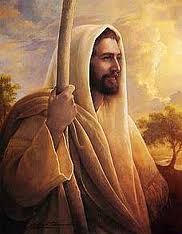Mark 10:17-31 Inherit Eternal Life
Mark 10:17-31 NLTse As Jesus was starting out on his way to Jerusalem, a man came running up to him, knelt down, and asked, “Good Teacher, what must I do to inherit eternal life?” (18) “Why do you call me good?” Jesus asked. “Only God is truly good. (19) But to answer your question, you know the commandments: ‘You must not murder. You must not commit adultery. You must not steal. You must not testify falsely. You must not cheat anyone. Honor your father and mother.'” (20) “Teacher,” the man replied, “I’ve obeyed all these commandments since I was young.” (21) Looking at the man, Jesus felt genuine love for him. “There is still one thing you haven’t done,” he told him. “Go and sell all your possessions and give the money to the poor, and you will have treasure in heaven. Then come, follow me.” (22) At this the man’s face fell, and he went away very sad, for he had many possessions. (23) Jesus looked around and said to his disciples, “How hard it is for the rich to enter the Kingdom of God!” (24) This amazed them. But Jesus said again, “Dear children, it is very hard to enter the Kingdom of God. (25) In fact, it is easier for a camel to go through the eye of a needle than for a rich person to enter the Kingdom of God!” (26) The disciples were astounded. “Then who in the world can be saved?” they asked. (27) Jesus looked at them intently and said, “Humanly speaking, it is impossible. But not with God. Everything is possible with God.” (28) Then Peter began to speak up. “We’ve given up everything to follow you,” he said. (29) “Yes,” Jesus replied, “and I assure you that everyone who has given up house or brothers or sisters or mother or father or children or property, for my sake and for the Good News, (30) will receive now in return a hundred times as many houses, brothers, sisters, mothers, children, and property–along with persecution. And in the world to come that person will have eternal life. (31) But many who are the greatest now will be least important then, and those who seem least important now will be the greatest then.”
The lessons moved from defining a relationship to how to act in a relationship and its rewards. Mark already wrote about the relationship Jesus had with Moses, Elijah, and God. Mark also showed how Jesus used children as an example of how His disciples need to open their hearts to what He was teaching. Jesus also answered the Pharisee’s question about divorce, reminding them what God intended the marriage covenant to be. All of these pointed to our relationship with God. Now Jesus is asked how to inherit eternal life. What role does a relationship with God play in receiving eternal life?
The disciples saw a familiar site, a young man dressed in rich robes coming to Jesus. As the young man knelt before Jesus they noticed the man’s numerous and ornate jewelry. Gold chains, rings and bracelets announced his status and love of riches. The disciples wondered what the man wanted from Jesus. They remembered the time Jesus raised the daughter of a young ruler back to life. They waited for the man in front of Jesus to plead his case.
His chains and bracelets chimed as he pleaded with Jesus, calling more attention to his wealth. Jesus could hear some of the comments people made about the young man as he asked his question. “Good Teacher, what must I do to inherit eternal life?” Everyone grew silent, waiting for Jesus’ answer. Jesus gave everyone plenty of time to formulate their own answer before supplying His. “Why do you call me good?” Jesus asked. “Only God is truly good. But to answer your question, you know the commandments: ‘You must not murder. You must not commit adultery. You must not steal. You must not testify falsely. You must not cheat anyone. Honor your father and mother.'”

The disciples thought there was something strange about Jesus’ answer which consisted of five things the man should not do and only one which he needed to do. Looking at the expensive jewelry the disciples tried to see the connection between his wealth and the five, “you must not,” commandments. What connection did expensive jewelry have with murder, adultery, stealing, false testimony, and cheating? They began to wonder how the man obtained such riches. There was also the question of honoring his father and mother. Did Jesus know something about this man? Did the methods he used to obtain such riches bring shame to his father and mother?
While the disciples were judging the man, he answered Jesus’ question commands. “Teacher,” the man replied, “I’ve obeyed all these commandments since I was young.” Now the disciples were perplexed. Did they misjudge the man? Is this the lesson Jesus was leading to, holding off judgment until the facts were gathered? Looking at the man, Jesus felt genuine love for him. “There is still one thing you haven’t done,” he told him. “Go and sell all your possessions and give the money to the poor, and you will have treasure in heaven. Then come, follow me.”
The thought of such a man joining the group sent a variety of thoughts through the disciples minds. Some looked at the man as a real asset. Having a rich ally would eliminate a lot of worry. All their needs would be met. Think of the fine houses they could stay in and feasts they would attend. Others were afraid such an influence would introduce a temptation they were not prepared for. Jesus looked around at the disciples. He could see some with smiles, others with bewildered looks. Is it possible all the disciples missed the message? Jesus told the man to sell all his possessions. Jesus did not need the type of help money and influence could supply. Finally Jesus looked back at the rich young man. His face fell, and he went away very sad, for he had many possessions.
Some of the disciples had a look of shock on their faces, others a look of relief. Jesus looked around and said to his disciples, “How hard it is for the rich to enter the Kingdom of God!” This amazed them. But Jesus said again, “Dear children, it is very hard to enter the Kingdom of God. In fact, it is easier for a camel to go through the eye of a needle than for a rich person to enter the Kingdom of God!” Jesus’ comment about a camel going through the eye of a needle brought a chorus of nervous laughter from the disciples. No one wanted to comment, based on the fact they all noticed Jesus repeated the term, “Kingdom of God,” three times. They all stood by, waiting for Jesus to explain the subject in depth. Jesus only looked back at them, so finally they asked, “Then who in the world can be saved?” Jesus looked at them intently and said, “Humanly speaking, it is impossible. But not with God. Everything is possible with God.”
The disciples were still concentrating on the Kingdom of Heaven and how they planned to get in. Peter missed Jesus’ answer, “Everything is possible with God.” Peter, like the others were trying to think of what they needed to give up to get into Heaven. If the rich young man had to give up everything, what did they have to do? Then Peter began to speak up. “We’ve given up everything to follow you,” he said. Jesus knew the disciples had a habit of missing the point because they did not pay attention to everything He said, and did not take time to see how the Spirit lead to this lesson. In another display of His patience, Jesus provided an answer designed for the understanding they had achieved up to that point. “Yes,” Jesus replied, “and I assure you that everyone who has given up house or brothers or sisters or mother or father or children or property, for my sake and for the Good News, will receive now in return a hundred times as many houses, brothers, sisters, mothers, children, and property–along with persecution. And in the world to come that person will have eternal life. But many who are the greatest now will be least important then, and those who seem least important now will be the greatest then.” Jesus acknowledged their sacrifice at the same time introduced the future He was preparing them for.
Did Jesus want His disciples to give up physical houses, brothers, sisters, mother, father, children, or property? Was Jesus referring to a deeper spiritual meaning? Jesus was referring to the influence these things have on people. When we look back to the parable of the sower, we see two categories all these items fit into. They either teach a lesson showing how Satan takes the seeds away, or how seeds mature in good ground. To a degree, the category depends on the individual.
Material possessions can have a negative influence taking seeds way from our hearts. On the other hand, seeds can be planted in the hearts of those same people which can sprout, grow and produce more fruit. This is why Jesus spent so much time teaching about relationships. Material possessions can be used for good or bad. This is why Jesus began his series of lessons about relationships by showing a few of His disciples a vision of Heaven. They had to know there is a difference between the world’s concept of relationships, and Heaven’s perfect reality. Jesus first showed them the reality of Heaven before promising they will receive now in return a hundred times as many houses, brothers, sisters, mothers, children, and property.
 After the lesson of Heaven was introduced, another began. The disciples saw the love of a father for His son, and how an evil spirit tried to sever that relationship. The spirit was difficult to cast out. The disciples could not do it, but Jesus could. Jesus wanted them to see how determined the enemy was. Demons had one goal, to take the seed of relationship from their hearts. Without relationships, people cannot share the blessings they share. They are left with nothing more than self serving greed.
After the lesson of Heaven was introduced, another began. The disciples saw the love of a father for His son, and how an evil spirit tried to sever that relationship. The spirit was difficult to cast out. The disciples could not do it, but Jesus could. Jesus wanted them to see how determined the enemy was. Demons had one goal, to take the seed of relationship from their hearts. Without relationships, people cannot share the blessings they share. They are left with nothing more than self serving greed.
Jesus tied to explain the prophecies He had to fulfill, but the disciples did not want to listen. Jesus was searching for support from them. Instead they argued about who was greatest. They failed to listen to Jesus and learn. Jesus told them another important lesson about relationships. The kind of relationship they needed to build with others to build a successful spiritual life. “Anyone who welcomes a little child like this on my behalf welcomes me, and anyone who welcomes me welcomes not only me but also my Father who sent me.” (Mark 9:37 NLTse).
Jesus was showing them, they had to give up a part of themselves before they could learn to follow Him. He used the illustration of loosing a hand, foot, or eye to enter the Kingdom of God. Were the disciples beginning to understand?
The Pharisees then asked Jesus His opinion on divorce. He told them they did not understand. Jesus knew they used divorce as a model for their faith. They placed all the power in the hands of the man, and nothing but obedience on women. This mirrored the religion they followed and taught. They placed God as the head, people as obedient followers, and themselves in the middle, in charge of deciding who was acceptable and who to issue a decree of spiritual divorce. Their image of marriage suited their desires. Instead of attacking their beliefs, Jesus answered by telling them what God intended marriage to stand for, unity between a man and wife, representing the relationship with God Jesus came to teach.
Now the question is, what do people need to give up to enter Heaven? Do they need to give up riches, fame, glory, family, and homes? Is Jesus asking them to give up everything to follow Him, the influences they have on individuals, or are other factors involved? Is Jesus asking to give give up preoccupation and worries associated with riches? Is He asking some to give up the disgraceful means used to obtain riches? Is Jesus asking others to give up the less than noble way they treat their family? What about excess pride in a home or other possessions? Answers like these only come when a personal relationship is established with God’s Spirit, which is the lesson Jesus has been progressively teaching.
How close do you need to get to Jesus to obtain eternal life? Jesus told the man to give up his riches. Jesus also said, “come, follow me!” Is there a balance between the two? How does one influence the other? Why did Jesus go through life homeless and penniless? Was Jesus only referring to giving up material things?
